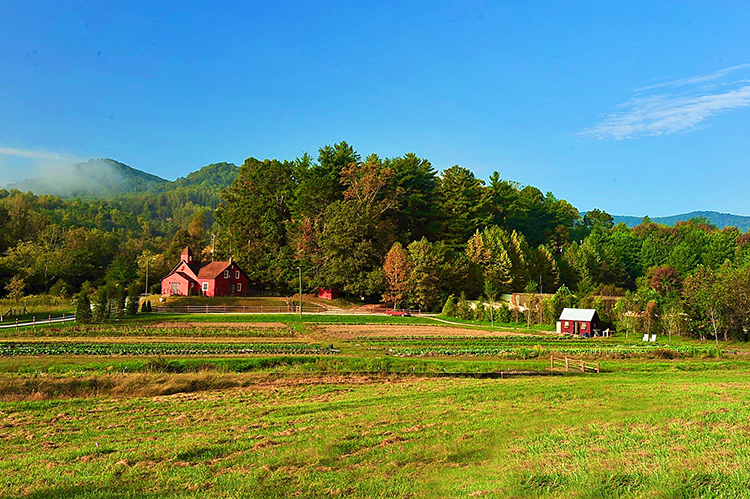
CREEKSIDE FARM. PHOTO: CREEKSIDE FARM AT WALNUT COVE, ASHEVILLE, NORTH CAROLINA
By Anna DeSimone
Locally produced food is the fastest-growing market sector of the United States Department of Agriculture (USDA). Countless studies have shown that eating fresh, locally grown food is more nutritious and that buying locally helps the environment in a number of ways. Sustainable agriculture protects wildlife, supports our ecosystem, and lowers our carbon footprint.
Wouldn’t it be nice to live close to a farm, where the “farmer you know” plants, feeds, and harvests the food on your table? Welcome to the agrihood, a healthy lifestyle community centered around a working farm.
The term agrihood, which combines the words agriculture and neighborhood, was coined by the nation’s earliest developers of these farm-centric communities. Many communities are built on heritage farmland, where original barns, silos, and windmills dot the landscape.
For the most part, agrihoods are surrounded by conservation land, offering miles of groomed trails for walking, biking, and hiking along natural habitat.
Most agrihoods have a professionally managed farm and store, where residents buy freshly harvested fruits, vegetables, herbs, flowers, and farm-raised eggs. The store may also sell food from local producers such as poultry farmers, ranchers, fisheries, and artisans who share the farm’s high standards for sustainable agriculture and biodiversity. You’ll also find many communities offering a “farm share” program, where no money is exchanged for a weekly supply of fresh food from the farm’s most bountiful crops.
In addition to the working farm, the many agrihoods also set aside acreage for a community garden, where residents can grow their own produce. Irrigation is provided by the developer, and there may be a garden shed nearby with tools for residents to use. Staff agriculturalists often conduct educational workshops, as well as assist with planting and caring for personal gardens.
The list of amenities found in agrihoods is endless, and typically includes resort-style clubhouses, swimming pools, state-of-the-art fitness centers, wellness spas, yoga studios, meditation gardens, boating, fishing, golf, horseback riding, cafes, and restaurants.
The agrihood lifestyle lets people to connect with nature, their neighbors, and members of the farm team. There are currently about 100 urban and suburban agrihoods in the U.S. and more on the way. The communities described below reflect a diverse range of amenities generally found in agrihoods throughout the nation.
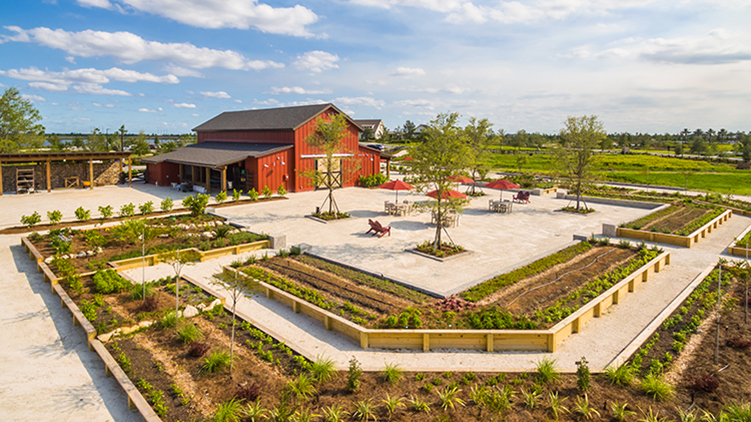
A healthy lifestyle community centered around a working farm
Arden, Florida
Arden, located in Palm Beach County, Florida, offers a “living classroom” for residents who can be a part of the organic farming production through volunteer days under the direction of the farm team. Arden’s professionally managed farm produces more than 50 varieties of fruits, vegetables, herbs, and flowers that are distributed to residents through a farm share program. The Barn is where residents pick up their food, attend educational workshops, and gather for healthy-living themed events. In addition to a community clubhouse and pools, residents can enjoy walking and biking around Aden Lake, kayaking, bass fishing, and birdwatching throughout 500 acres of green space.
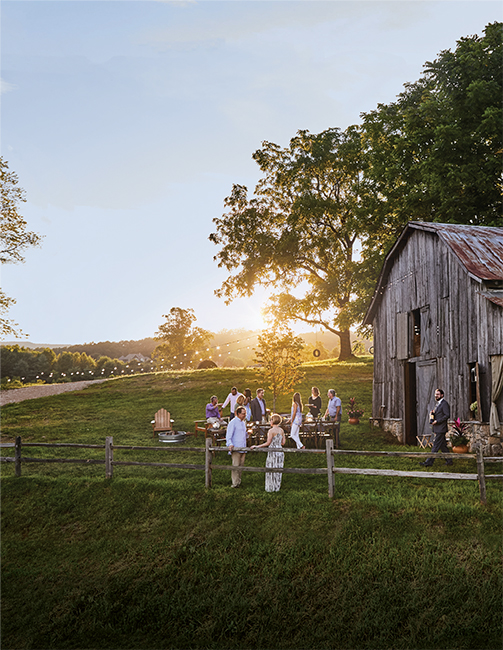
CREEKSIDE BARN
Creekside Farm, North Carolina
Creekside Farm at Walnut Cove, located in Asheville, North Carolina is a 60-acre farm with a 100-year history that is deeply rooted in sustainable agricultural traditions. Within the beautiful pastoral landscape sits a red schoolhouse built in 1920, re-purposed as the Creekside Farm Education Center. The farm includes fruit orchards, a hops farm, livestock, beehives, and free-range chickens.
All homes have 360-degree views of the Blue Ridge Mountains and a Jack Nicklaus Golf Course. Creekside Farm at The Cliffs at Walnut Cove is one of the seven vibrant communities spread among 20,000 acres at The Cliffs in the Carolina mountains, where all residents have access to 7 integrated wellness centers, 7 champion golf courses, dozens of restaurants, and an infinite array of activities.
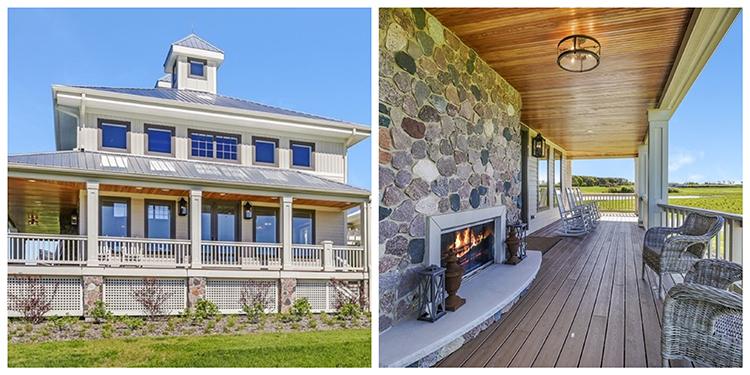
SEROSUN FARMS
Serosun Farms, Illinois
Serosun Farms is located in Hampshire, Illinois, just an hour from downtown Chicago. Situated in over 400 acres of picturesque countryside, Serosun features an impressive equestrian center that offers professional boarding and care for horses. The 160-acre working farm supplies fresh organic produce, and residents can enjoy fishing ponds, 40 acres of woodlands, and 8 miles of trails.
Serosun is introducing active living cottages and an assisted living and memory care facility at the Illinois location. Future development plans include Rios Canyon Ranch, located on a 616-acre avocado ranch just east of El Cajon, California. The project features an integrated seniors’ community that is rich with amenities and fits into the ranch and agricultural operations. Seniors will have access to health and wellness amenities and a continuum of care that ranges from active adult living to assisted living, skilled nursing, and hospice care—all within the community.
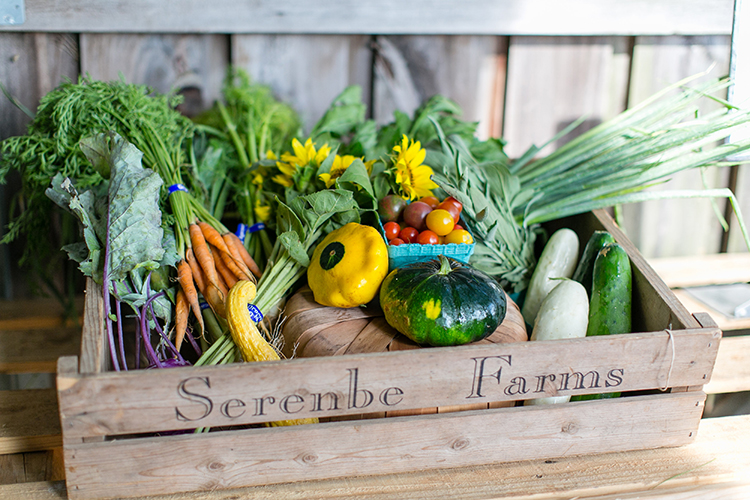 FOOD BOX. PHOTO CREDIT: SERENBE FARMS, CHATTAHOOCHEE HILLS, GEORGIA
FOOD BOX. PHOTO CREDIT: SERENBE FARMS, CHATTAHOOCHEE HILLS, GEORGIA
Serenbe Farms, Georgia
Serenbe Farms in Chattahoochee Hills, Georgia is a 1,400-acre community located just outside of Atlanta and comprised of five distinctive hamlets with diverse landscapes, creeks, lakes, and ponds. The 25-acre organic farm produces over 300 varieties of vegetables, herbs, and flowers. Serenbe is a vibrant, walkable community with a town square that includes 5 restaurants, boutique shops, a spa, art gallery, bookstore, professional workspaces, and townhomes.
Well known for its cultural amenities such as the Serenbe Playhouse, music festivals, and famed artist-in-residence program, Serenbe offers an abundance of activities for a well-lived life. Future development plans include senior housing and an assisted living facility.














